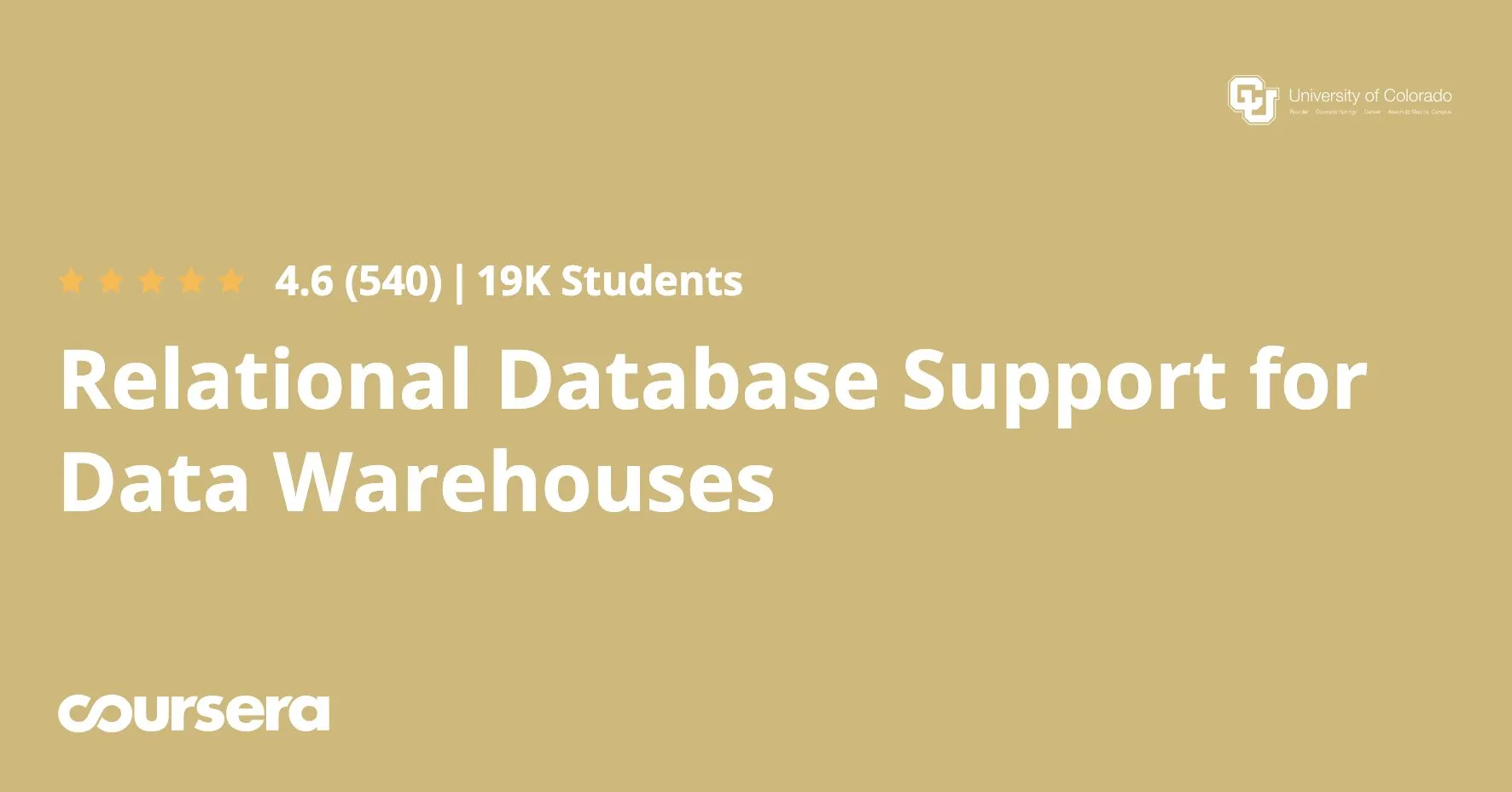
Relational Database Support for Data Warehouses 
This course provides an introduction to the use of relational databases to support data warehouses, including the use of SQL for data manipulation and query. Students will gain an understanding of the fundamentals of relational databases and their application in data warehousing. ▼
ADVERTISEMENT
Course Feature
![]() Cost:
Cost:
Free
![]() Provider:
Provider:
Coursera
![]() Certificate:
Certificate:
No Information
![]() Language:
Language:
English
![]() Start Date:
Start Date:
Self Paced
Course Overview
❗The content presented here is sourced directly from Coursera platform. For comprehensive course details, including enrollment information, simply click on the 'Go to class' link on our website.
Updated in [March 06th, 2023]
This course provides an overview of the support for relational databases in data warehouses. It covers topics such as data warehousing, materialized views, data warehouse design, and SQL. Students will learn how to design and implement data warehouses using relational databases, as well as how to use SQL to query and manipulate data. The course also covers best practices for data warehouse design and maintenance. By the end of the course, students will have a better understanding of the support for relational databases in data warehouses and be able to design and implement data warehouses using relational databases.
[Applications]
The application of this course can be seen in the design and implementation of data warehouses. Students will learn how to use relational databases to support data warehouses, including the use of materialized views and SQL. They will also gain an understanding of the importance of data warehouses in the modern business environment. Suggestions for further application of this course include the use of data warehouses to support business intelligence, analytics, and reporting, as well as the use of data warehouses to support data mining and machine learning.
[Career Paths]
1. Database Administrator: Database Administrators are responsible for the installation, configuration, maintenance, and security of databases. They must ensure that the data is stored securely and is accessible to authorized users. They must also be able to troubleshoot any issues that arise with the database. As data warehouses become more complex, the need for Database Administrators with experience in data warehousing is increasing.
2. Data Warehouse Developer: Data Warehouse Developers are responsible for designing, developing, and maintaining data warehouses. They must be able to create efficient data models and write complex SQL queries to extract data from the data warehouse. They must also be able to optimize the data warehouse for performance and scalability. As data warehouses become more complex, the need for Data Warehouse Developers with experience in relational databases is increasing.
3. Data Warehouse Architect: Data Warehouse Architects are responsible for designing and implementing data warehouses. They must be able to create efficient data models and write complex SQL queries to extract data from the data warehouse. They must also be able to optimize the data warehouse for performance and scalability. As data warehouses become more complex, the need for Data Warehouse Architects with experience in relational databases is increasing.
4. Data Warehouse Analyst: Data Warehouse Analysts are responsible for analyzing data from the data warehouse. They must be able to write complex SQL queries to extract data from the data warehouse and analyze it to identify trends and patterns. They must also be able to create reports and dashboards to present the data in an easy-to-understand format. As data warehouses become more complex, the need for Data Warehouse Analysts with experience in relational databases is increasing.
[Education Paths]
1. Bachelor of Science in Computer Science: This degree program provides students with a comprehensive understanding of computer science principles and technologies, including database design, data warehousing, and SQL. Students will learn how to design and implement data warehouses, create and maintain materialized views, and use SQL to query and manipulate data. Additionally, students will gain an understanding of the latest trends in data warehousing and database support.
2. Master of Science in Data Science: This degree program provides students with an in-depth understanding of data science principles and technologies, including data warehousing, data mining, and machine learning. Students will learn how to design and implement data warehouses, create and maintain materialized views, and use SQL to query and manipulate data. Additionally, students will gain an understanding of the latest trends in data warehousing and database support, as well as the use of machine learning algorithms to analyze and interpret data.
3. Master of Business Administration in Data Analytics: This degree program provides students with a comprehensive understanding of data analytics principles and technologies, including data warehousing, data mining, and machine learning. Students will learn how to design and implement data warehouses, create and maintain materialized views, and use SQL to query and manipulate data. Additionally, students will gain an understanding of the latest trends in data warehousing and database support, as well as the use of machine learning algorithms to analyze and interpret data.
4. Doctor of Philosophy in Data Science: This degree program provides students with an in-depth understanding of data science principles and technologies, including data warehousing, data mining, and machine learning. Students will learn how to design and implement data warehouses, create and maintain materialized views, and use SQL to query and manipulate data. Additionally, students will gain an understanding of the latest trends in data warehousing and database support, as well as the use of machine learning algorithms to analyze and interpret data.
Pros & Cons

Engaging lecturer

Real world requirements

Handson course

Integrates concepts and practice

Well prepared course

Requires more time to learn

Brief introduction to big data and data governance

Simple assignments
Course Provider

Provider Coursera's Stats at AZClass
Relational Database Support for Data Warehouses introduces the use of relational databases to support data warehouses, including data manipulation and query using SQL. This online course will give learners a comprehensive understanding of relational database support for data warehouses. Learners will learn about data warehousing, materialized views, and SQL. They will learn how to design and implement a data warehouse, create and maintain materialized views, and use SQL to query and manipulate data. Additionally, learners will understand where data warehousing is headed and best practices for using it.
Discussion and Reviews
0.0 (Based on 0 reviews)
Explore Similar Online Courses

Personal Finance: Basics of Financial Management

F# for Beginners

Python for Informatics: Exploring Information

Social Network Analysis

Introduction to Systematic Review and Meta-Analysis

The Analytics Edge

DCO042 - Python For Informatics

Causal Diagrams: Draw Your Assumptions Before Your Conclusions

Whole genome sequencing of bacterial genomes - tools and applications

The Data Analyst Course: Complete Data Analyst Bootcamp

Data Analysis in Excel


Start your review of Relational Database Support for Data Warehouses